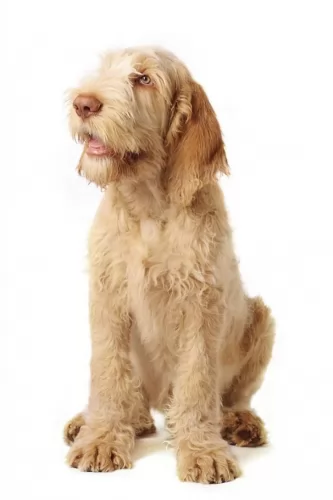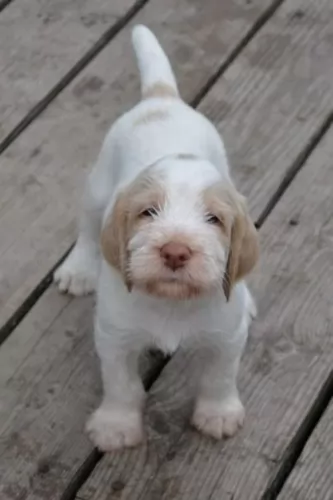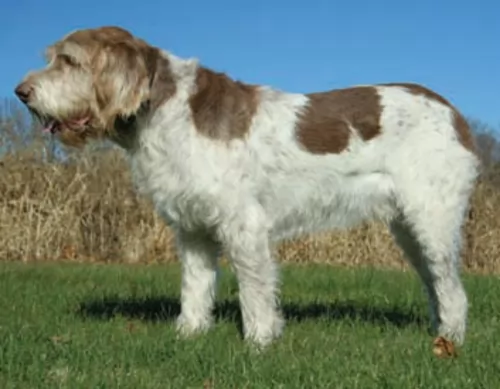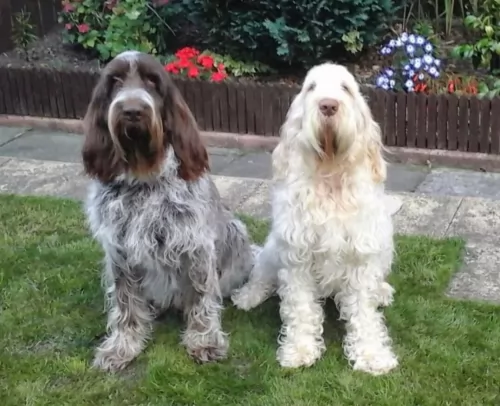 Petzlover
PetzloverDogo Cubano is originated from Cuba but Spinone Italiano is originated from Italy. Dogo Cubano may grow 15 cm / 5 inches shorter than Spinone Italiano. Dogo Cubano may weigh 7 kg / 16 pounds more than Spinone Italiano. Both Dogo Cubano and Spinone Italiano has almost same life span. Dogo Cubano may have less litter size than Spinone Italiano. Dogo Cubano requires Low Maintenance. But Spinone Italiano requires Moderate Maintenance
The Cuban Mastiff which came from Cuba, was developed from breeds of Mastiffs, Bulldogs and cattle dogs, with the breed being thought to be extinct since the end of the 19th century.
The Dogo Cubano had a number of roles to fulfill in its day and they were used for guarding stock, for dog fighting and for chasing runaway slaves. After the abolishment of slavery, the large dog had no real role and it died out.
Known also as the Cuban Mastiff or Mastin de Cuba, there isn’t much accuracy as to its origins, with the most common story for their origin being that they are descendants of the Molossus.
The dogs were later introduced into Western Europe, becoming fairly common in England and Spain. The dog was also was also mentioned in the works of canine authors Stonehenge and George Wood.
 This Italian breed has an ancient blood line tracing all the back to 500 BC. Originally bred to hunt, he is today a friendly, alert and loyal companion. He is intelligent enough to do any job you give him. The Spinone is thought to be one of the oldest gun dogs ever, but it is not entirely clear that he came from Italy. There are some who think he may have come from somewhere in these European countries – Italy, Greece, France, Celtic Ireland, Spain or Russia. However, most believe the breed came from Italy in the Piedmont area.
This Italian breed has an ancient blood line tracing all the back to 500 BC. Originally bred to hunt, he is today a friendly, alert and loyal companion. He is intelligent enough to do any job you give him. The Spinone is thought to be one of the oldest gun dogs ever, but it is not entirely clear that he came from Italy. There are some who think he may have come from somewhere in these European countries – Italy, Greece, France, Celtic Ireland, Spain or Russia. However, most believe the breed came from Italy in the Piedmont area.
The most common thinking is that he is a descendent of the Spanish Pointer and/or the Russian Setter. One other theory is that setters from Greece were brought to the Roman Empire and crossed with a variety of Italian dog to make the coarse haired Spinone we see today. Then the French put in their claim that the breed is a cross of many French pointers.
The theory that counts might just belong to the Italians who believe the ancestor to the Spinone includes the German Wirehaired Pointer, the Pudelpointer and the Wirehaired Pointer. It was not until the 19th century that the name Spinone was officially given to the breed.
Before that it might have been known as a Spinoso and named after a thorn bus in Italy called the Spino. This bush was so thick and sharp that small prey animals learned to hide under it because the predators could not get through it. The Spinone however was able to fight through the briars with its thick, coarse hair and tough skin.
The breed almost became extinct during the second world war as before and after the hunters in Italy had started to use other breeds for hunting. Breeders also began to cross the Spinone with wire hairs like German Wirehaired Pointer, the Wirehaired Pointing Griffon and the Boulet.
The most popular hunting dog in Italy today is the Bracco Italiano while the Spinone is still used for hunting.
The Dogo Cubano was generally similar to other Mastiffs and stood at rough 48 – 55cm in height and weighing in the region of 45kg.
He was a large dog, powerfully built, muscular and strong. Images of the dog show that it had strong, straight legs with a long tapering tail and medium-sized floppy ears that were sometimes cropped upwards and close to the head.
The dog breed came in a variety of colors such as brown, tan, fawn and brindle. The muzzle was broad and short and black. The dog had pronounced jowls with its face being fairly wrinkly.
This large dog was known for being a courageous, independent and aggressive dog. He became attached to his owner, showing protective characteristics .In those days the dog would have received simple training and certainly if such a large dog still existed today, it would have to receive training and socialization as well.
The Dogo Cubano was an intelligent dog and easily trainable, requiring an owner with a firm hand. Being an aggressive breed, the dog possibly wouldn’t have been the best companion for children. He also wouldn’t have got on too well with pets in the home as he was trained to be a fighter in his day. Independent and strong-willed, the dog would not have suited a novice dog owner.
 The breed is made up of strong, solid and muscled dogs that have an almost square build. His legs are made to travel any terrain and his head is long with an occipital that is pronounced and unique to the Spinone. They are said to have “human appearing eyes”, with a docked tail in countries allowing it and webbed paws.
The breed is made up of strong, solid and muscled dogs that have an almost square build. His legs are made to travel any terrain and his head is long with an occipital that is pronounced and unique to the Spinone. They are said to have “human appearing eyes”, with a docked tail in countries allowing it and webbed paws.
Shorter hair covers their feet, head, legs, muzzle and ears. They have longer hair on their eyebrows and it is stiff, with soft hair on the muzzle and cheeks with a beard and mustache. It is a single coated dog though the coat is rough. They should have skin, lips, nose, and pads in colors that coordinate with their coats. For white dog it is a red-orange color, brown in dogs that are roan colored and dark red-orange in the orange and white colored dog.
The Dogo Cubano was bred to be a guard dog as well as for dog fighting, but this large dog, with training and socialization, no doubt became a loyal and devoted family pet.
It was actually a social dog, being aggressive towards other dogs. He would be described as a dog better suited to a home with older children.
He was protective with his human family but not very active, being too big to be leaping around like other dog breeds. It is a pity that this large dog has disappeared as he had some good qualities.
 3.Adaptability – Young dogs need a lot of attention but they don’t need a lot of space. The young dogs are energetic while the adult dogs are laid-back. They need exercise every day and at least a small back yard.
3.Adaptability – Young dogs need a lot of attention but they don’t need a lot of space. The young dogs are energetic while the adult dogs are laid-back. They need exercise every day and at least a small back yard.
The Dogo Cubano was a generally healthy breed, but just like with most other dog breeds, they were also prone to some of the more common dog problems. The chances of him getting sick were slim though.
When the dog first originated, there were unlikely to have been health clearance certificates, but today, you’d want health clearances from the Orthopedic Foundation for Animals.
The reason for this is that hip dysplasia is a heritable condition, seen more often in large dogs, where the thigh bone doesn’t fit into the hip joint properly. The dog suffers with pain and discomfort and the condition can lead to lameness with the dog.
Gastric Torsion or Bloat is a life threatening condition that affects large dogs like the Dogo Cubano and those with deep chests. The stomach is distended with gas and it can twist.
The gas can’t escape and blood flow is hindered. The dog vomits, is lethargic and weak, and immediate veterinary help will be required.
 This is an ancient breed with not a lot of documented genetic issues, but it does have one deadly condition.
This is an ancient breed with not a lot of documented genetic issues, but it does have one deadly condition.
• Cerebellar ataxia (CA) is inherited and hits the puppies. Because it is a recessive gene both the mother and father must carry it for the puppy to inherit it. This makes it less likely than it would be otherwise. Puppies with the condition do not live more than a year. Since it is a genetic problem there is now a test for it that identifies carriers at a 95% accuracy rate.
• Like many other large breed dogs, they are susceptible to hip dysplasia. This can cause arthritis and/or lameness. There are now hip replacement surgeries available for this condition.
• Bloat is again common in large dogs and you need to watch for it with the Spinone. It can be deadly if not treated immediately. Let your dog rest quietly after eating. Do not let her exercise or play energetically after eating.
The Dogo Cubano was a large dog, so if he did become used to living in the city, he would have adapted better to life in the country.
He wasn’t a dog requiring too much exercise but he would have needed to go for walks. They were used as guard dogs long ago, and if he had been in existence today, you wouldn’t have been able to include him in your jogging and cycling as he was a dog that could easily overheat.
Not all dogs require the same amount of food. Long ago the Dogo Cubano wouldn’t have had the same variety of dog foods available today. Maybe the dog in those days was fed the same kind of food that his owner ate.
Today, if these dogs were still around, they would require the best quality ‘large dog breed’ kibble.
The better the dog food, the more nourishing it is and the healthier the dog is. The Dog Cubano would likely have been a dog that drooled, leaving quite a bit of backwash in the water bowl, so it would have been important to wash out the drinking bowl and to regularly replace it with cool, fresh water.
 1Feeding the puppy – feed a high quality dog food for puppies of large breeds. Feed 3-4x day but don’t overfeed or let him exercise after eating even as a puppy.
1Feeding the puppy – feed a high quality dog food for puppies of large breeds. Feed 3-4x day but don’t overfeed or let him exercise after eating even as a puppy.
2.Feeding the adult - feed a high quality dog food for large breeds. Feed 1-2X day but don’t overfeed or let him exercise after eating.
4. Games and Exercises – The Spinone is an active breed, but not a fast dog. In fact, they like to travel at a trot so it becomes a great dog for jogging or running with. They love to jump, track, hunt, hike. They do well with agility, retrieving, flyball, carting, being a therapy dog, a rescue dog and a watchdog.